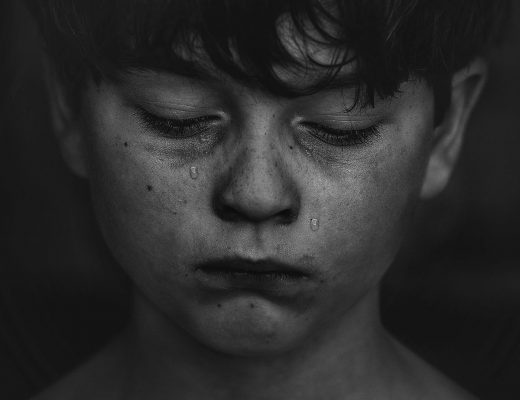In the spring of 1999 I and another member of the American Red Cross boarded a flight bound for the Balkan conflict in Kosovo. A veteran of many humanitarian assignments, I felt no particular concern about the trip. But on the evening of my departure the chronic anxiety that had become a part of my daily life suddenly flared into full-fledged panic and even as the plane pulled away from the gate I stood and demanded to be let off the aircraft.
Walking to the office early the next morning I wondered what I would say to my colleagues, how I would explain my presence in the office versus a Balkan refugee camp. I was embarrassed, ashamed, and most of all, confused. Why had I panicked? Why was anxiety becoming such a constant – and growing – part of my life? Why did I feel as if my life was spiraling out of control? In my heart I cried out to God, “What is wrong with me?” And then, an answer.
“The truth shall set you free.” Walking across the dimly lit parking lot outside the office, I froze. What was that? Where did it come from? It wasn’t a voice, it didn’t really even arrive in words. Even if we are not students of the Bible, most of us are familiar with these words. But never had I experienced them as I did that morning. They came over me or, more accurately, they unfolded within me as a kind of divine intelligence. There was a sense of immense love behind the message, a feeling that their author knew me far better than I knew myself and, just as important, knew what I needed at that moment in time.
A sublime joy swept over me because I knew, instantly, that I’d experienced the highest possible truth; a truth that transcended existence itself. It told me, simply, that the origins of all of my fears and anxieties lay in my lies and self-deceit, and therefore that the path to overcoming that suffering was to do away with the lies.
Suddenly, the missed flight to Kosovo seemed meaningless, my shame melted away and I almost skipped to the office. “God” (or whatever you want to call the architect of that message) had given me the prescription I needed. I would live by the truth and in so doing heal what ailed me.
And then I walked into the office and lied. Encountering my confused colleagues – “Aren’t you supposed to be in Kosovo?” “What are you doing here?” – the old fears returned en masse. “I” took charge, immediately coming up with talk of a “stomach bug” that forced me from the aircraft lest I sicken everyone onboard. Years of practice made me lighting-quick with a credible lie and this one even made me a selfless hero, reluctantly abandoning my heroic mission so as to protect the physical well-being of my fellow passengers and traveling colleague. The lie was accepted and my ego’s image of itself was safely preserved yet again. Life would proceed as before, this most recent of whoppers added to the rest so that my self-loathing would continue to grow. I was not yet ready to put an end to my suffering.
*****
It would be easy at this juncture to fill several pages with explanations and defenses for why I was so deeply unhappy; to describe the years of negative conditioning that resulted in this deeply unhappy, insecure human being. But as I’ve come to learn, all human suffering stems from the same basic cause; it differs only in the myriad ways the mind expresses and spins it for consumption. To focus on the “why” to our suffering is to lose the opportunity being granted us to at last overcome it. Suffering is a gift, an invitation from the soul and one to which the ego refuses to RSVP.
As noted in Part 1 of this series, we suffer until we reach the point where our suffering overwhelms the ego’s defenses; where we at last say, “Enough!” and either commit to healing or, in the case of a Gene Sprague, leap from a bridge. It is that place where the world no longer has anything to offer us and, to all the other egos out there, is a foreign and dangerous place that must be labeled and tucked away like everything else it cannot understand (the suicide is “mentally ill,” the spiritual seeker is “woo woo,” now let’s get on with “real life”). For me, I’d reached that point of no return, and it was during my Vision Question in Utah that I received the whispered urgings of my soul to “know myself.”
Weakened by 100 hours of fasting but fueled by the seemingly divine message I’d received on my Vision Quest, I staggered out of that Utah canyon fully committed to knowing myself. But how? Where did I go from there? Why hadn’t I been given more guidance than that one sentence? And then, it occurred to me that I had. Seven years earlier, a similarly profound and familiar message: “The truth shall set you free.”
Of course! The path to knowing oneself must logically begin with a disciplined approach to truth. I could not accomplish one without the other. Interestingly, just weeks before departing for my Vision Quest a dear friend offered me a key ingredient to his own recipe for happiness: Absolute honesty with others. We even laughed at the ludicrousness of humans actually having to make a personal commitment to telling the truth, as if it was some novel concept. But it is.
Being rigorously honest with others is not, in fact, easily done, and my friend warned me that even as I embraced such a path many old friendships would collapse under the weight of my newfound commitment to truth. As immortalized in the words of the bellicose Col. Jessup in the film A Few Good Men, we humans aren’t so good at handling the truth.
So it was that as the spring of 2006 progressed I felt adequately armed with all that I needed to at last overcome a lifetime of suffering. I was passionate about healing myself, I understood that the journey required me to know myself, and I had a laser-like focus on using truth as the instrument for getting me there. Only, it didn’t work.
*****
Even as I emptied my life’s closets and crawl spaces of its seemingly endless population of skeletons; even as I confessed to a lifetime’s worth of fears large and small; and even as I confronted others with their own lies, my depression worsened. Far from setting me free, the truth appeared to be imprisoning me in still more pain and suffering. Initially I wondered whether the act of shedding all of that old, fictitious skin was simply leaving me feeling raw and vulnerable.
But as has so often been the case over these past few years, a steady diet of self-inquiry, meditation, prayer, walks in the woods, hours-long talks with my wife, and a commitment to extended periods of silent reflection eventually led me to an answer: the “truth” to which I’d been setting my compass was of the human – which is to say, egoic – variety.
Human truth, as I came to see, is capricious and subjective, based as it is entirely on the uniquely conditioned thoughts of its author. My truth is unlikely to be the same as yours, and vice versa. If my wife and I cannot even agree on the color of a sunset; if we humans struggle to recall the contents of a conversation held only hours earlier; if each of us comes of age conditioned by a unique collection of human, cultural, environmental and biological variables, how in the world can we settle on something called “the truth”? While Col. Jessup may not have been the most savory of characters, the truth to which he was so staunchly committed was his truth and he would not have that truth denied.
The “truth” to which I’d been dispatched so many years earlier was none other than the “self” my Vision Quest had advised me to find; they were one and the same. The trick now was to determine who, or what, this being called “I” was all about.
To be continued….


